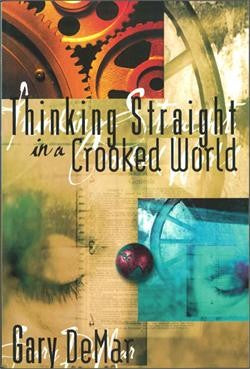Gary is interviewed by David Vaughn on his radio show, Worldview Matters. Gary and David discuss two big topics currently in the media: abortion and mass shootings.
When the sixteenth-century German Reformer Martin Luther “was called to defend his rejection of indulgences before the church and before the emperor, Luther, alone and in peril of his life, appealed to the authority of the Word of God. ‘Here I stand,’ he said; ‘I can do no other.’”[1] There was no appeal to tradition, the expert testimony of church scholars, scientists, or even the precisely fashioned creeds. It’s not that these aren’t helpful; they simply are not ultimate authoritative starting points.
In Matthew 7:24–27, Jesus points out that “the strength of a foundation determines whether a house will withstand heavy rains and strong winds. If a man builds his house on sand, it will fall; but if he builds his dwelling on solid rock, it will stand secure even in a fierce storm.”[2] If the foundation upon which the apologist uses to build his worldview is compromised in any way, then it will eventually collapse when challenged. Therefore, the starting point in any defense of the truthfulness of the Christian worldview is all-important. Will it be a foundation of sand or one of solid rock?
It is upon a final standard—a standard to which no greater appeal is made—that all worldviews rest.[3] What we are looking for in our apologetic task is a reliable gauge of truth that does not depend on the fallible, finite, and fallen character of man for validation. What we need is an authoritative touchstone by which all other claims to ultimate authority can be tested:
In the days of the gold rush men used a touchstone, a fine grained dark stone, such as jasper, to determine the quality of the gold which they had discovered. Today a Geiger counter is used to locate uranium and other precious metals. In baseball the umpire makes the decisions in the contest between the pitcher and the batter. In the courtroom the judge decides questions of law. In their respective fields the touchstone, the Geiger counter, the umpire and the judge speak with authority.[4]
But even these are not ultimate authorities. More fundamental principles and guidelines stand behind these measuring devices. The umpire is bound by a rule book. A group of men determine the rules that are finally published in the book. But the very idea that there are objective rules is fundamental to the entire process. Where do the concepts of value, right and wrong, rules, and the principle of judgment come from? Where do these precepts find their validity so that people generally follow them with little or no argument? How does one account for such abstractions in a materialistic universe? Are they made up? Do they change from generation to generation? When it comes to the most important questions about life and death we want and need reliable and authoritative answers. To answer these questions (and many others like them) with certainty and authority, an ultimate and reliable standard must be found. For centuries, philosophers have embarked on such a quest. How successful have they been? If the history of philosophy is any indicator, the results are at best mixed. From platonism to post-modernism, from Aristotle to Zoroaster, each view of the world seemingly contradicts every other view.

Thinking Straight in a Crooked World
The nursery rhyme ‘There Was a Crooked Man’ is an appropriate description of how sin affects us and our world. We live in a crooked world of ideas evaluated by crooked people. Left to our crooked nature, we can never fully understand what God has planned for us and His world. God has not left us without a corrective solution. He has given us a reliable reference point in the Bible so we can identify the crookedness and straighten it.
Buy NowGary is interviewed by David Vaughn on his radio show, Worldview Matters. Gary and David discuss two big topics currently in the media: abortion and mass shootings. Gary points out that every moral argument requires a foundational system and that the biblical worldview protects both the unborn child and the right to self-defense.
Click here for today’s episode
Click here to browse all episodes of The Gary DeMar Podcast
[1] Gene Edward Veith, “Millennium on our Mind,” World (August 7, 1999), 27.
[2] Richard L. Pratt, Jr., Every Thought Captive: A Study Manual for the Defense of Christian Truth (Phillipsburg, NJ: Presbyterian and Reformed, 1979), 1.
[3] Greg L. Bahnsen, Always Ready: Directions for Defending the Faith (Texarkana, AR: Covenant Media Foundation, 1996), 70–75.
[4] George M. Marston, The Voice of Authority (Nutley, NJ: Presbyterian and Reformed, 1960), xv.

